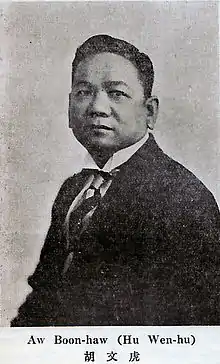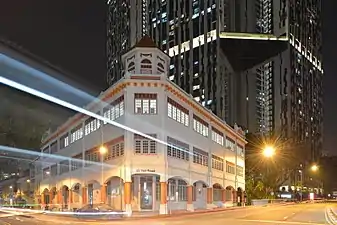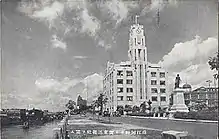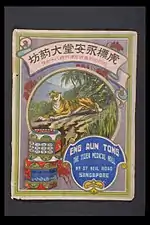Aw Boon Haw
Aw Boon-Haw (Chinese: 胡文虎; pinyin: Hú Wénhǔ; Pe̍h-ōe-jī: Ô͘ Bûn-hó͘; 1882 in Yangon, British Burma – 1954 in Hawaii), OBE, was a Burmese Chinese entrepreneur and philanthropist best known as founder of Tiger Balm. He was a son of Hakka herbalist Aw Chu-Kin, with his ancestral home in Yongding County, Fujian Province, China.
Aw Boon Haw | |||||||||||||||||||
|---|---|---|---|---|---|---|---|---|---|---|---|---|---|---|---|---|---|---|---|
胡文虎 | |||||||||||||||||||
 Aw Boon-Haw (Who's Who in China 4th ed.,1931) | |||||||||||||||||||
| Born | 1882 | ||||||||||||||||||
| Died | 1954 (aged 72) | ||||||||||||||||||
| Resting place | Tiger Balm Garden, Hong Kong | ||||||||||||||||||
| Nationality |
| ||||||||||||||||||
| Other names | Tiger Balm King | ||||||||||||||||||
| Occupation |
| ||||||||||||||||||
| Known for |
| ||||||||||||||||||
| Board member of | Eng Aun Tong | ||||||||||||||||||
| Children |
| ||||||||||||||||||
| Parent(s) | Aw Chu Kin (Father) | ||||||||||||||||||
| Relatives | Aw Boon Leng (Eldest Brother) Aw Boon Par (Youngest Brother) | ||||||||||||||||||
Career
In 1926, Aw migrated to present day Malaysia, where he cofounded the Tiger Red Balm business with his brother, Aw Boon-Par. Aw also founded several newspapers, including Sin Chew Jit Poh in Singapore and Sin Pin Jit Poh in Penang (both currently based in Malaysia); and Sing Tao Daily (which dates back to 1938 and is currently based in Hong Kong). Aw moved to Hong Kong during the Japanese occupation of Singapore and managed the business from there, while his brother stayed in Singapore until he closed down the factory and went to Rangoon. One of his sons was also killed during the Japanese occupation of Singapore. Aw returned to Singapore after the end of World War II and re-established his business.
Death
In 1954, at the age of 72, Aw died from a heart attack following a major operation in Honolulu while on a trip to Hong Kong from Boston, US. He is remembered through his work with Haw Par Villas throughout Asia, with locations in Singapore, Hong Kong, and the Fujian province of China.
Legacy
His sons took over his businesses after Aw's death.
Personal life
Aw's adopted daughter is the Hong Kong businesswoman and former Chinese People's Political Consultative Conference member Sally Aw. Sally Aw squandered the vast fortune and was on the brink of bankruptcy. Tiger Balm Gardens and the Aw Boon-Haw Gardens in Hong Kong were sold to the territory's billionaire, Li Ka-Shing, for US$13 million in 1998.
The daughter of Aw Boon-Haw and his fourth wife, Aw Seng (胡星), resides in Singapore and has set up a company under her father's name, Aw Boon Haw Pte Ltd, to continue the heritage and legacy of her father. Aw Boon-Haw's fourth wife died on 10 April 2012 in Vancouver aged 100.
Gallery
 A memorial hall in Lei Yue Mun Waterfront School
A memorial hall in Lei Yue Mun Waterfront School Aw Boon-Haw & Aw Boon-Par Memorial Hall at the School for the Blind, a Tiger Balm charity in Rangoon, Burma
Aw Boon-Haw & Aw Boon-Par Memorial Hall at the School for the Blind, a Tiger Balm charity in Rangoon, Burma Haw Par Villa in Fujian, unfinished after 1949 and the death of Aw Boon Haw in 1954; finished by his daughter in 1990s
Haw Par Villa in Fujian, unfinished after 1949 and the death of Aw Boon Haw in 1954; finished by his daughter in 1990s Former Eng Aun Tong in Singapore
Former Eng Aun Tong in Singapore Eng Aun Tong in Guangzhou
Eng Aun Tong in Guangzhou Eng Aun Tong advertisement in 1930s
Eng Aun Tong advertisement in 1930s
References
- (in Chinese) 胡文虎
- (in Chinese) 胡文虎父女的汕頭緣
- Sin Yee Theng and Nicolai Volland, "Aw Boon Haw, the Tiger from Nanyang: Social Entrepreneurship, Transregional Journalism, and Public Culture," chapter 5 in Christopher Rea and Nicolai Volland, eds. "The Business of Culture: Cultural Entrepreneurs in China and Southeast Asia" (UBC Press, 2015).
- Cochran, Sherman. Chinese Medicine Men: Consumer Culture in China and Southeast Asia. Cambridge: Harvard University Press, 2006.
